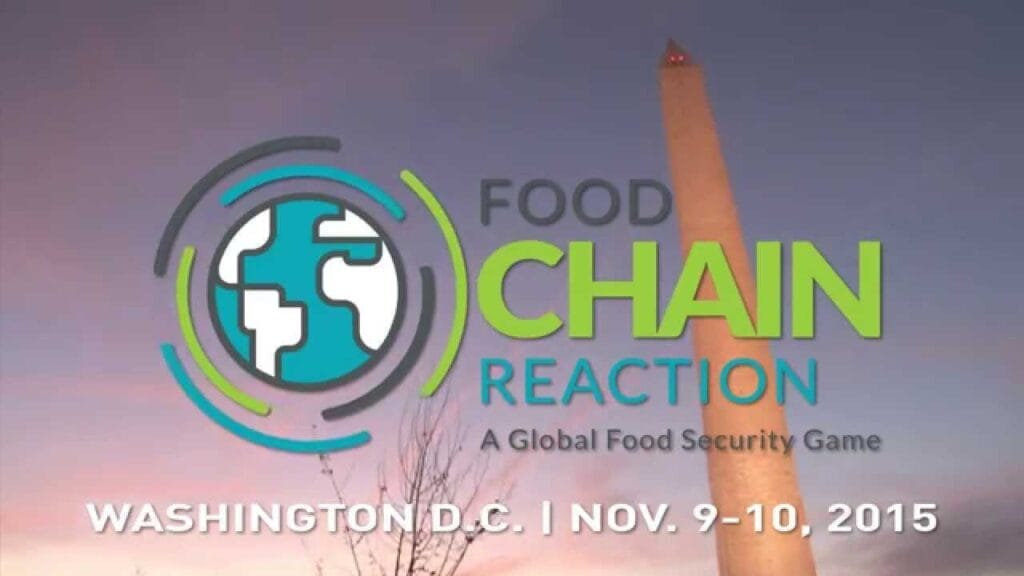This concept is something The WinePress has been highlighting for the last several years, and is steadily gaining more mainstream attention, as this latest innovation in the food and agricultural space is being primed to set the stage to become the so-called ‘new normal.’
This latest push was detailed in a lengthy and “sciencey” piece published by The New Yorker last week, going into great detail how a new line of bio-hacked crops can fertilize themselves, and how it will ultimately accommodate supply chain disruptions and crop failures, and work to fight climate.
The following are some of the salient points in that article:
Here’s the thing about nitrogen. It’s essential for life—a key ingredient in both DNA and proteins. It also makes up seventy-eight per cent of the air we breathe. It would be useful for us if we could pull nitrogen out of the air and make use of it inside our bodies. But nitrogen atoms typically come in pairs—N2 molecules—that our cells can’t easily pry apart. Instead, we get our nitrogen by eating plants, or by eating animals that eat plants (or animals that eat animals that eat plants).
Unfortunately, plants are in the same boat. They can’t make direct use of atmospheric nitrogen, either. In fact, the only cells on Earth that can render nitrogen palatable for plants and animals are certain kinds of microbes. These microbes, known as diazotrophs, “fix” nitrogen, by using N2 to make NH3, also known as ammonia. The nitrogen in this ammonia is ready to eat. The survival of every plant and animal on Earth depends on the work of diazotrophs, which must fix enough nitrogen to keep the biosphere’s machinery running.
[…] Self-fertilizing plants have been a scientific goal since the nineteen-seventies. In 1972, two British scientists published a paper in Nature reporting that they’d induced E. coli, a bacterial species that does not normally fix nitrogen, to do so, by importing genes from another bacterial species that does. Quick progress to plants seemed imminent. A 1975 Science paper, citing the Nature paper among others, carried the title “Nitrogen Fixation Research: A Key to World Food?” […] Vipula Shukla, a plant biologist and senior program officer for agriculture at the Bill & Melinda Gates Foundation, told me that success will require more than engineering plants. She pointed to the complementary roles of genetics, environment, and management—the so-called G x E x M paradigm. “I think it’ll probably be a while before we see that translation at scale, in a diversity of crops in the field where farmers are cultivating food,” she said. “But the first time it happens will be exciting. The second and third and tenth or hundredth time it happens is when we really get to societal impact.” Along the way, scientists will also have to prove that the technology is safe, durable, and cost-effective. […] There are other approaches to possibly increasing nitrogen fixation on cropland. One is to take a cue from legumes, which, unlike cereals, can fix nitrogen, in a way. They form a symbiosis with bacteria, which infect their roots. The root builds a structure around the infection called a nodule. “So it’s a little nitrogen-fixing factory there on the plant root,” Dixon said. “It’s beautiful.” The plant supplies carbon and nutrients in exchange for ammonia. But genetically programming cereals to grow nodules could be even more complicated than programming them to generate nitrogenase. “It’s like a whole lot of legal teams trying to work out, you know, how are they going to merge?,” said, [Craig Wood, a plant synthetic biologist at C.S.I.R.O., Australia’s science agency], of the plant-microbe symbiosis. “They’re still trying to work out terms and conditions.” (The Gates Foundation has funded both nitrogenase, through [Luis Rubio, a biochemist at the Spanish National Research Council], and nodule engineering.)Some cereals build looser associations with bacteria, allowing the organisms to form biofilms on their roots. “It’s not as intricate,” Wood said. “But there’s always this trade-off. The plant is not quite sure if the bacteria is actually a pathogen, so there’s a limiting effect. They don’t really want to hand out sugar and carbon to bacteria without being sure what they’re going to get back.” He noted an ingenious maize in Mexico that drips sugar onto the soil from aerial roots; this allows the plant to feed nitrogen-fixing bacteria without risking invasion. But that plant grows slowly. Meanwhile, Bill Gates has invested in Pivot Bio, a company that aims to genetically engineer microbes to more efficiently fix nitrogen in crop soil. Such a solution would make diazotrophs better; it wouldn’t be as profound a transformation as truly self-fertilizing plants.
Although [William Crookes, the president of the British Association for the Advancement of Science], in 1898, that we stood “in deadly peril of not having enough to eat,” today there’s no global food shortage; we waste about a third of what we produce. But there are local food crises created in part by problems with food distribution and storage. The fertilizer-supply chain is also a factor. Shocks including the pandemic, the war in Ukraine, and inflation have quickly more than doubled the price of fertilizer in some countries, leading to widespread hunger. Even in the best of times, fertilizer production uses vast amounts of energy and resources, and its application poisons the environment. Snapp told me that self-fertilizing crops could reduce agriculture’s greenhouse impact by a third, both by reducing the production and transport of fertilizer and by allowing more crops to be grown locally. Shukla suggested that these engineered plants could help alleviate poverty in regions of the world where crops are a major economic driver and farmers can’t afford synthetic fertilizer. Self-fertilizing plants aren’t an existential need for humanity, but they would be of great benefit.
[…] “This will happen more often now,” Rubio told me. “I mean, we’re getting closer. We will see more and more of these reports, like, ‘We got it! It’s a miracle! We just put the genes in and it all worked.’ ” The nitrogenase system is complex; it keeps turning out to be more delicate than it looks. But that doesn’t mean we aren’t making progress. Sometime in the next decade or two, we could finally have Rube Goldberg machines on Mars.As noted earlier, The WP has been following this topic across a number of articles, as the overall process described is coming closer and closer to being realized on a commercial scale.
Bill Gates, for example, has previously promoted the use of gene-edited crops and livestock. SEE: Bill Gates Says ‘Every Piece Of Bread I’ve Ever Eaten Is From Genetically Modified Wheat’ During Climate Conference In Kenya
Organic food is a small part of the market that’s very expensive. But every piece of bread I’ve ever eaten is high-productivity wheat, GMO wheat. Every piece of corn I’ve eaten is GMO corn.
These are things that billions of years of using these products have been done. […] These are proven, proven products – nobody’s trying to take something that hundreds of millions of people haven’t already been eating with the perfect safety record.
Gates said in 2022, during a conference tour in Africa
Moreover, this push and acceptance for gene-spliced foods was something forecast in the Food Chain Reaction simulation 2015, headed by the World Bank, Cargill, and other influential groups; which predicted that these new types of crops would become the ‘new normal’ and status quo moving, due to famine and climate change.

AUTHOR COMMENTARY
Whoso mocketh the poor reproacheth his Maker: and he that is glad at calamities shall not be unpunished.
Proverbs 17:5
That’s what all these people like Bill Gates are, and all those involved in that simulation that predicted all of this – greedy, conniving people that are glad at calamities. They are being used to enact judgment on the world right now, replacing real food with even more fake and harmful foods, that we can already imagine will make people sick; but one day God will be sure to pay them a visit as well, as our proverb suggests.
Until then, these ultra-frakenfoods are going to be enforced on people, after more artificial and staged famines and supply chain disruptions are brought in.
[7] Who goeth a warfare any time at his own charges? who planteth a vineyard, and eateth not of the fruit thereof? or who feedeth a flock, and eateth not of the milk of the flock? [8] Say I these things as a man? or saith not the law the same also? [9] For it is written in the law of Moses, Thou shalt not muzzle the mouth of the ox that treadeth out the corn. Doth God take care for oxen? [10] Or saith he it altogether for our sakes? For our sakes, no doubt, this is written: that he that ploweth should plow in hope; and that he that thresheth in hope should be partaker of his hope. (1 Corinthians 9:7-10).
The WinePress needs your support! If God has laid it on your heart to want to contribute, please prayerfully consider donating to this ministry. If you cannot gift a monetary donation, then please donate your fervent prayers to keep this ministry going! Thank you and may God bless you.








Thankfully, regardless of what the parasitic class does to our food, God sanctifies our food and nourishes our bodies.
I like that Proverb about them being punished because they deserve whatever God gives them since they have murder in their hearts. So while they are planning these fake plants for us they’re going to grow their own notorious food on all the land Bill Gates has purchased? I got a hunch God will interrupt Billy’s well planned scheme to do away with us. It will be the other way around.
From the true and only word of God the KJV bible, Galatians 6:7 Be not deceived; God is not mocked: for whatsoever a man soweth, that shall he also reap. (KJV)
Proverbs 1:31 Therefore shall they eat of the fruit of their own way, and be filled with their own devices. (KJV)
they have it coming indeed.